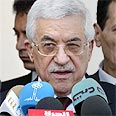
PA Chairman Mahmoud Abbas
צילום: איי פי
Palestinian Authority: A guide for the perplexed
Ynet brings you an abridged guide to chaos, anarchy and politics as the Palestinian Authority heads to elections. First in a three-part series
When Mahmoud Abbas was elected chairman of the Palestinian Authority a year ago, both Israel and the Palestinian Authority hoped his election would lead to meaningful change. But a year later, things have never been worse in the PA, and there has never been as much uncertainty about its future – and about ours.
At midnight on December 31st, all Palestinian organizations announced that as far as they were concerned the truce was over. Most organizations marked the occasion by firing rockets towards Israel. Hamas, for its part, was more careful in its statement, and its military wing announced that following the end of "tahadiya," (temporary calm), the Palestinian resistance would respond to Israeli "crimes" against the Palestinians.
How long will Hamas hold its fire?
The general assessment is that a delay in the PA elections (January 25) would draw the organization (which has continued arming itself over the past few months and even supplying ammunition to other organizations) into the cycle of violence and terror.
Should we expect a new wave of terror? Is the truce over?
For all practical purposes, the truce is in its last gasps. All Palestinian armed factions, including Fatah's al-Aqsa and other Fatah groups have announced there is no point in talking about the truce. Islamic Jihad continues its duplicitous game in which the political leadership in the territories continues "support" the truce, while the military wing sets the tone in attacks and rocket fire from the Gaza Strip.
Hamas continues to maintain an ambiguous stance: Group leaders abroad, headed by Khaled Mashal, talk about the end of the truce, while leaders in Gaza say the organization has yet to formulate its position.
Much depends on the decision regarding the participation of the movement in the elections and about the regional ‘games' related to the pressure on Syria and Iran. Most analysts predict no major changes before the PA elections, and say the truce will be sustained in one form or another with controlled outbursts of violence.
Why does it seem like there is an absolute state of security-related chaos in the territories?
During the election campaign, Abbas promised the Palestinians two things: real reform and security for its citizens. On the first matter, PA analysts are divided on the matter. On the second, more important campaign slogan, Abbas' report card is less ambiguous. The recent deterioration of the security situation hurts not only Palestinian citizens, but also hangs a big question mark on the ability of the PA to continue to operate – and some say to continue to survive.
Still, optimists say there are rules to the anarchy and power games currently gripping the PA, and especially Fatah. They say people know their limits and who's the boss: "There is anarchy, true, but there isn't total chaos," they say.
What big changes have affected the PA since Abbas took over?
Despite the fashionable tendency to doubt the chairman's ability to clean up the PA, there is no doubt that his greatest achievement is the truce with the armed Palestinian groups reached in March. Despite the exceptions, including attacks inside Israel and rocket fire from Gaza, the truce was essential for the success of the disengagement. This marked, if only unilaterally, a political shift.
Abbas has managed to retain a public perception that despite everything, there is a certain rule of law, there is increased police enforcement, relatively serious handling of civil infractions, a fight against corruption and even the imprisonment of al-Aqsa Brigades, Islamic Jihad and other organizations which refused to obey the truce.
Want more proof? The Palestinian stock market broke records this year, much like the one on Ehad Ha'am Street in Tel Aviv.
So why does anarchy continue, internally and with regard to the rocket fire toward Israel?
Abbas has declared his commitment that during the election period, he won't be dragged into a civil war and will not force his electoral commitments on the Palestinian organizations. Except for a few cases in which Palestinian security forces have confronted Hamas operatives, he has had to mostly bite his lip and restrain himself every time the organization fired a rocket or carried out a suicide attack in an Israeli mall. Through dialogue, he succeeded in obtaining a certain truce, and was hoping to continue running things in the same manner, with determination but through dialogue.
His problem lies in the fact that for years, not a single element in the PA, during the Intifada or after, has demonstrated any true leadership. After so many years, criminals who benefited from the neglected conditions will not obey the rule of law, and the activists will not be quick to listen to the new chairman. Both groups have continued testing Abbas' patience.
So why the anarchy? There are hundreds of groups and independent units in the different apparatuses and maybe even more; in the Fatah there are quite a few non-obedient factions; there is direct Iranian influence or through Hizbullah on the ground; there is a Palestinian leadership residing abroad, mostly in Damascus, that pulls the strings mostly towards an escalation (like Khaled Mashal, for example). All these explain the ongoing state of anarchy.










